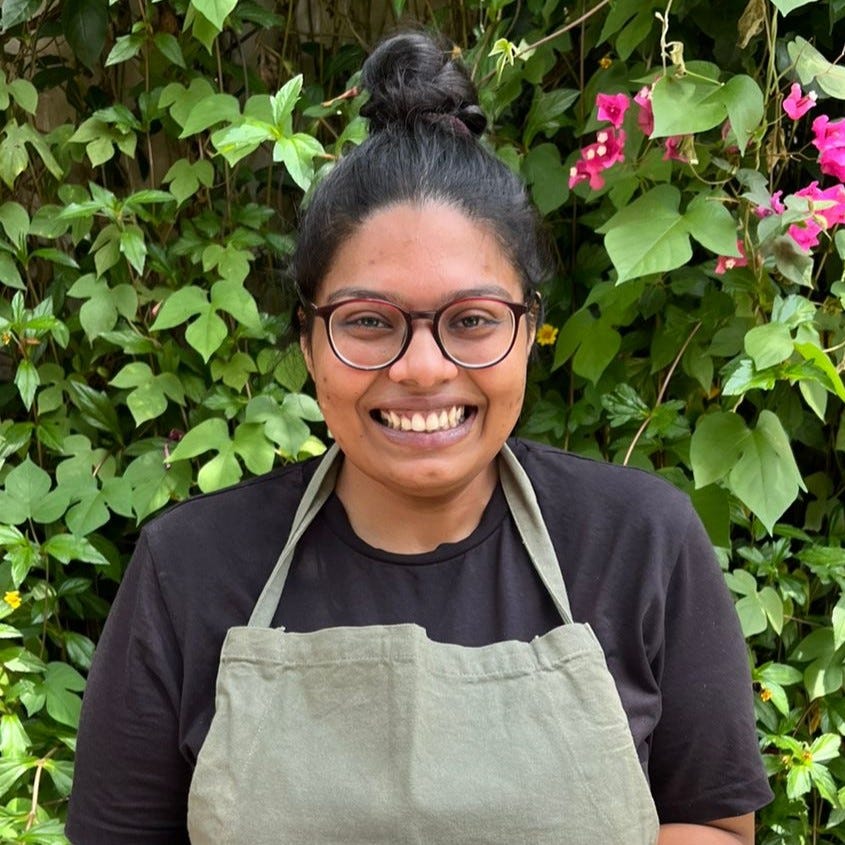"I think I've been really lucky"
Chef & writer Elizabeth Yorke on ideas, identity crisis, and satisfying a selfish curiosity to keep learning about food
Project envy. That’s the first thought I had when I went into the conversation with Elizabeth Yorke, a chef and writer from Bangalore. Her path to entrepreneurship in establishing Saving Grains, an initiative that upcycles discarded grain (or spent grain), a byproduct of brewing beer, has taken a circuitous route, one that’s filled with a deep desire to learn about the food system.
Along the way, Yorke started Edible Issues in 2018 (with engineer Anusha Murthy), initially as a newsletter curating news on the Indian food system. Today, the initiative focuses on a conversation around food, hosts public participatory projects, and is currently working on Roots to Resilience, a project that digs deep into stories about tubers and their communities.
Talking to Yorke on food and innovation, the resilience of tubers, her trajectory to culinary school, or her fluctuating identities as both a chef and a writer was illuminating and inspiring, and I can say that I’ve come out of our conversation learning a lot and yearning to do more in the world of food.
This is a long chat, so read throughout the weekend dipping in and out over cups of coffee. Or read it in one shot with a glass of whiskey. Either way, you’ll learn a lot like I did too. If you like what you’ve been reading on shelf offering, please share it with your friends and enemies (I don’t discriminate) and ask them to subscribe too. You can also follow along on Instagram.
Below is an edited transcript of our conversation.
Apoorva: Hi, Elizabeth, thank you so much for being here. It’s so nice to see you.
Elizabeth: Thanks Apoorva. I’m excited to be part of this.
Apoorva: What are some of your memories of cooking and eating? And how did that contribute to what you do now?
Elizabeth: Growing up, a couple of memories around food involved… as a family we’d always go out for special meals during birthdays and celebrations. And that idea of dining was super exciting because it was very novel. And to see that whole production of food being brought out in various stages... That was very fascinating in terms of hospitality and dining.
Back at home, I guess in some way, I was trying to recreate parts of whenever my parents would host parties, and I would somehow bring myself into that space of oh, I will handle this element. I'm talking about [a] 10/12 year old me thinking okay how I can make desserts, and keep in mind that my uncle is allergic to eggs. And I think that was very exciting for me to be able to produce that, obviously not in as professional a manner as it was done outside. But to be part of it. I always enjoyed watching food being prepared in home kitchens and I say watching because I don’t think that was something very actively that I participated in, growing up. We would help with making chapatis. I remember once we went to a neighbour's house and she showed us how to make aloo parathas. That was magical in terms of how she stuffed and rolled it. It was a fascinating space of how food also transformed itself.
Apoorva: You also mentioned doing like, desserts and small things… what were your specialties because you said you had to look up recipes that had no eggs. Or did you ask your mum? I'm very fascinated by that… kid Elizabeth, trying to make a cake. I'm trying to imagine what it was like.
Elizabeth: We did all sorts of wild things. So one of the first things I ever cooked as a kid was something called a ‘never fail chocolate cake’. And it was a simple recipe where you basically put one ingredient after the other in a mixer and blend it and pour it into a pan. And [we] didn't have an oven, so we cooked it in the microwave. That had a very interesting egg substitute—we'd put condensed milk, and it would work. It was good. So that was something my mum taught me to do when I was around eight, I think? And I think that became a family favourite, and something that would happen on occasions. Which then turned into… like for Christmas [it] became rum balls because we’d add some rum into it, squish it up and shape it out. Remember once [I] made a recipe for some white chocolate peppermint mousse that was piped into a martini glass…
Keep reading with a 7-day free trial
Subscribe to shelf offering to keep reading this post and get 7 days of free access to the full post archives.





